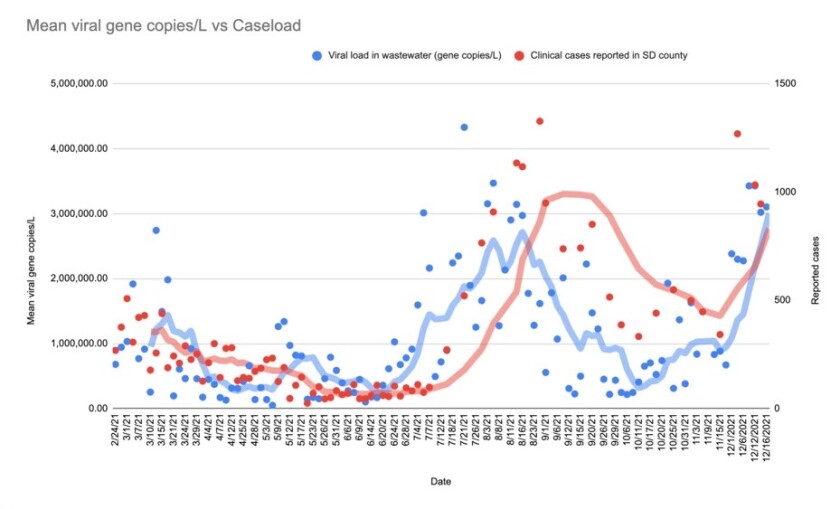If our toilets are any indication, San Diego County may be in for a sharp spike in coronavirus cases soon.
On Saturday, UC San Diego officials warned that samples from the Point Loma Wastewater Treatment Plant, which processes flushed waste from two out of every three San Diegans, has the highest levels of the coronavirus that the university has seen since February. Both the Delta and Omicron variants of the virus are fueling this rise.
Researchers have consistently found that when viral levels go up in wastewater, cases usually increase within a couple weeks, putting the region on track for a sizeable surge around the start of 2022. And that has scientists and public health officials again urging the unvaccinated to get vaccinated, the immunized to return for boosters, and everyone to think hard before attending large and unmasked indoor gatherings.
“There will be an unprecedented surge in COVID cases in San Diego. That is already in motion,” said Rob Knight, a microbiome expert and one of the leaders of UCSD’s wastewater surveillance effort. “There’s still an opportunity to keep this in the wastewater and out of the hospitals and out of the morgue.”
The surprise weekend announcement was the culmination of a short, intense scramble by the university. Around 4:30 p.m. Friday, Knight got a text message from a member of his team reporting the sharp increase. The university’s COVID-19 monitoring team then hustled to make sense of the data.
Their main question: Was Omicron driving the uptick? It would have taken at least a week to come up with an answer via genetic sequencing. So instead, researchers worked late into the night and Saturday morning to run a molecular test specifically designed to distinguish variants. That test revealed that both the Delta and Omicron variants were contributing to the rise.
“It’s like you have two pandemics going on at once, with different strains of the virus,” Knight said.
Wastewater testing works because although COVID-19 is best known for its attack on the airways, the virus also slips inside the cells lining the intestines and can be shed through a person’s stool before they feel sick.
Local data throughout the past year show that leaps in wastewater viral levels presage infections spotted by standard nose and throat swabs.

Data showing an unprecedented spike in levels of the coronavirus in samples collected from San Diego County’s primary wastewater treatment facility. The blue line represents virus levels in wastewater and the red line represents cases reported in the county.
(UC San Diego)
UCSD’s announcement included a statement from Dr. Wilma Wooten, the county’s public health officer, noting that the new findings confirm growing evidence that Omicron is spreading. And Dr. Christopher Longhurst, chief medical officer of UCSD Health, pleaded with the public to get tested early and often for the virus.
“If you feel the slightest symptoms, if you think you might have had contact with someone with COVID-19, if you’ve gathered in crowds without masks, if you’re planning a get-together — test, test, test,” he said in a statement. “Don’t wait.”